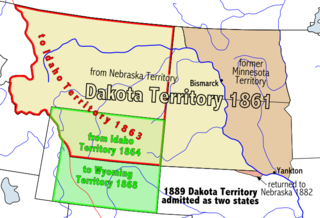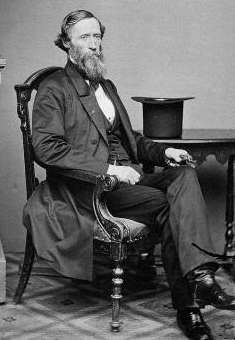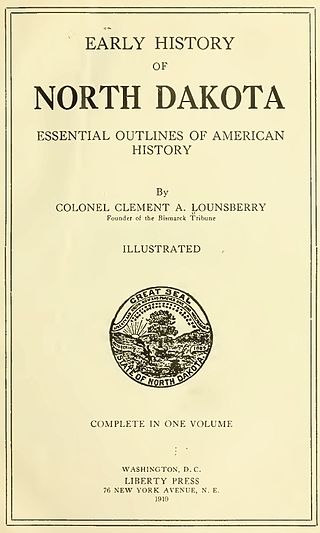Notes
- ↑ "South Dakota Legislators Historical Database-John W. Turner". Archived from the original on 2016-04-16. Retrieved 2014-02-21.
- ↑ About Turner County, South Dakota Mich. Historical Comm., Michigan Biographies (Lansing, MI: M.H.C, 1924)
John W. Turner (1800 - 1883) was an American politician.
Turner was born February 28, 1800, in Oneida County, New York.
Turner served in the Dakota Territorial Council from 1865 to 1867 and 1870 to 1871. Then he served in the Dakota Territorial House of Representatives from 1864 to 1865 and 1872 to 1863. He served from Clay and Turner Counties, Dakota Territory. [1] Turner County, South Dakota, was named after Turner. [2]
Turner died April 12, 1883, Turner County, South Dakota.

Davison County is a county in the U.S. state of South Dakota. As of the 2020 census, the population was 19,956. Its county seat is Mitchell. The county was created in 1873 and organized in 1874. It was named for Henry C. Davison, the first settler in the county.

The Territory of Dakota was an organized incorporated territory of the United States that existed from March 2, 1861, until November 2, 1889, when the final extent of the reduced territory was split and admitted to the Union as the states of North and South Dakota.

Walter Atwood Burleigh was an American physician, lawyer, and pioneer. He represented the Dakota Territory as a non-voting delegate to the United States House of Representatives.

Jefferson Parish Kidder was an American lawyer and jurist. He served as the non-voting delegate from the Dakota Territory to the United States House of Representatives. Kidder was the only Democratic lieutenant governor of Vermont until John J. Daley in 1965.

The territory of the United States and its overseas possessions has evolved over time, from the colonial era to the present day. It includes formally organized territories, proposed and failed states, unrecognized breakaway states, international and interstate purchases, cessions, and land grants, and historical military departments and administrative districts. The last section lists informal regions from American vernacular geography known by popular nicknames and linked by geographical, cultural, or economic similarities, some of which are still in use today.

Wilmot Wood Brookings was an American pioneer, frontier judge, and early South Dakotan politician. He was provisional governor of the Dakota Territory, and both the cities of Wilmot and Brookings as well as the county of Brookings, South Dakota are named for him.

The South Dakota Supreme Court is the highest court in the state of South Dakota. It is composed of a chief justice and four associate justices appointed by the governor. One justice is selected from each of five geographic appointment districts. Justices face a nonpolitical retention election three years after appointment and every eight years after that. The justices also select their own chief justice.

John L. Pennington was an American politician and newspaper publisher. He was an Alabama state senator, and the fifth Governor of Dakota Territory.

John Blair Smith Todd was a Delegate from Dakota Territory to the United States House of Representatives and a general in the Union Army during the American Civil War.

Nehemiah George Ordway was an American politician who was a New Hampshire state senator and the seventh Governor of Dakota Territory. Ordway was regarded as one of Dakota Territory's most controversial governors.

Coe Isaac Crawford was an American attorney and politician from South Dakota. He served as the sixth Governor and as a U.S. Senator.

Gideon Curtis Moody was an attorney and politician, elected in 1889 as a Republican United States Senator from South Dakota. He served two years. He also had served five years as an associate justice of the Dakota Territory Supreme Court, from 1878-1883, before entering private practice for a period as general counsel for Homestake Mine.

Philo Hall was a South Dakota attorney and politician. He served as Attorney General of South Dakota and a member of the United States House of Representatives.
John Turner (1929–2020) was the 17th Prime Minister of Canada.

John Alfred Pickler was an American politician. He served as a member of the United States House of Representatives.
Frank M. Ziebach was a noted political figure in the Dakota Territory during the territorial period from 1861 to 1889. He was a pioneer newspaperman, founding a number of newspapers in the Iowa and Dakota Territories, including the Yankton "Weekly Dakotan" in 1861, which is still published today as the Yankton "Press and Dakotan". He was known as the "squatter governor" of the Dakota Territory. Ziebach County, South Dakota was created in 1911, and is named for him.
Joseph William Lincoln Parmley was an American pioneer and early developer of the north central region of South Dakota during its early statehood. He is considered the "Father of the Yellowstone Trail," and is today memorialized by the J. W. Parmley Historical Home and Parmley Western Land Office museums in Ipswich, South Dakota.

The following works deal with the cultural, political, economic, military, biographical and geologic history of pre-territorial North Dakota, Dakota Territory and the State of North Dakota.
Clark W. Thompson (1825–1885) was a Canadian who served in the Minnesota State Senate, and the territorial House and Council for Minnesota Territory.